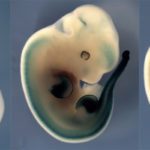Lien vers Pubmed [PMID] – 23650632
Philos. Trans. R. Soc. Lond., B, Biol. Sci. 2013;368(1620):20120358
Vertebrate genes are characterized by the presence of cis-regulatory elements located at great distances from the genes they control. Alterations of these elements have been implicated in human diseases and evolution, yet little is known about how these elements interact with their surrounding sequences. A recent survey of the mouse genome with a regulatory sensor showed that the regulatory activities of these elements are not organized in a gene-centric manner, but instead are broadly distributed along chromosomes, forming large regulatory landscapes with distinct tissue-specific activities. A large genome-wide collection of expression data from this regulatory sensor revealed some basic principles of this complex genome regulatory architecture, including a substantial interplay between enhancers and other types of activities to modulate gene expression. We discuss the implications of these findings for our understanding of non-coding transcription, and of the possible consequences of structural genomic variations in disease and evolution.

